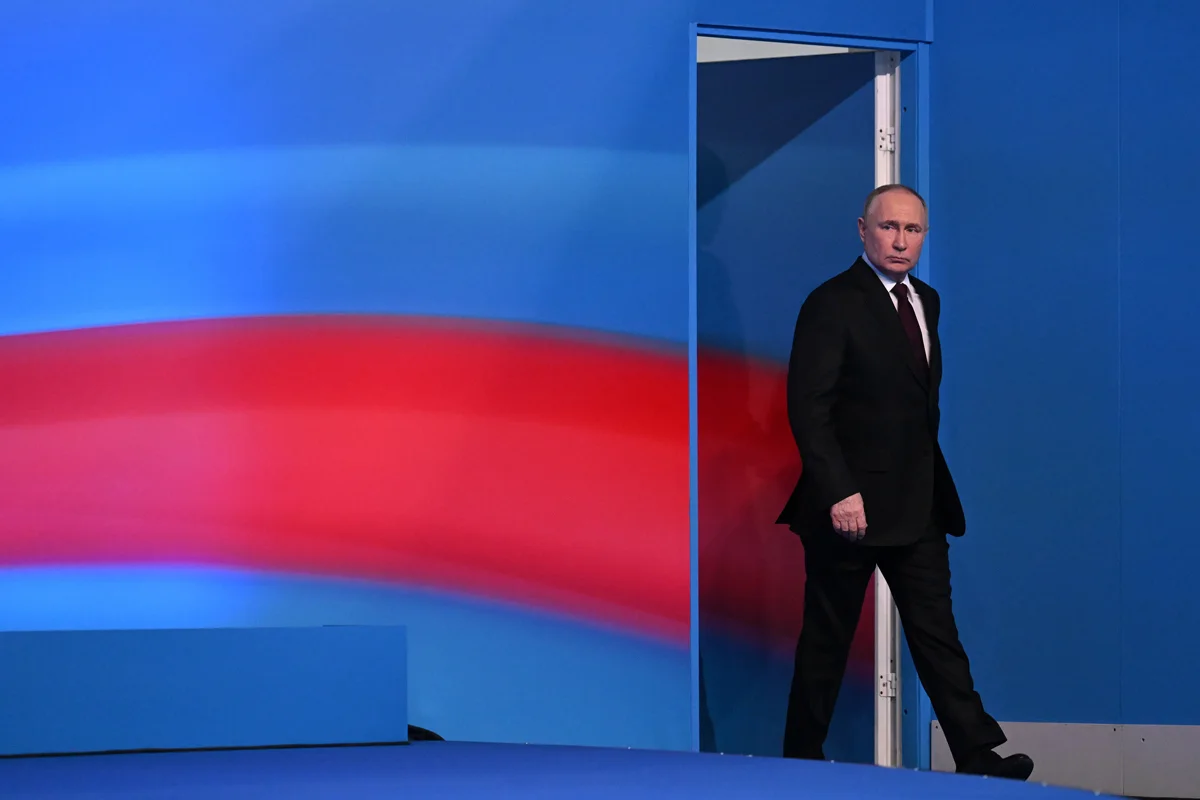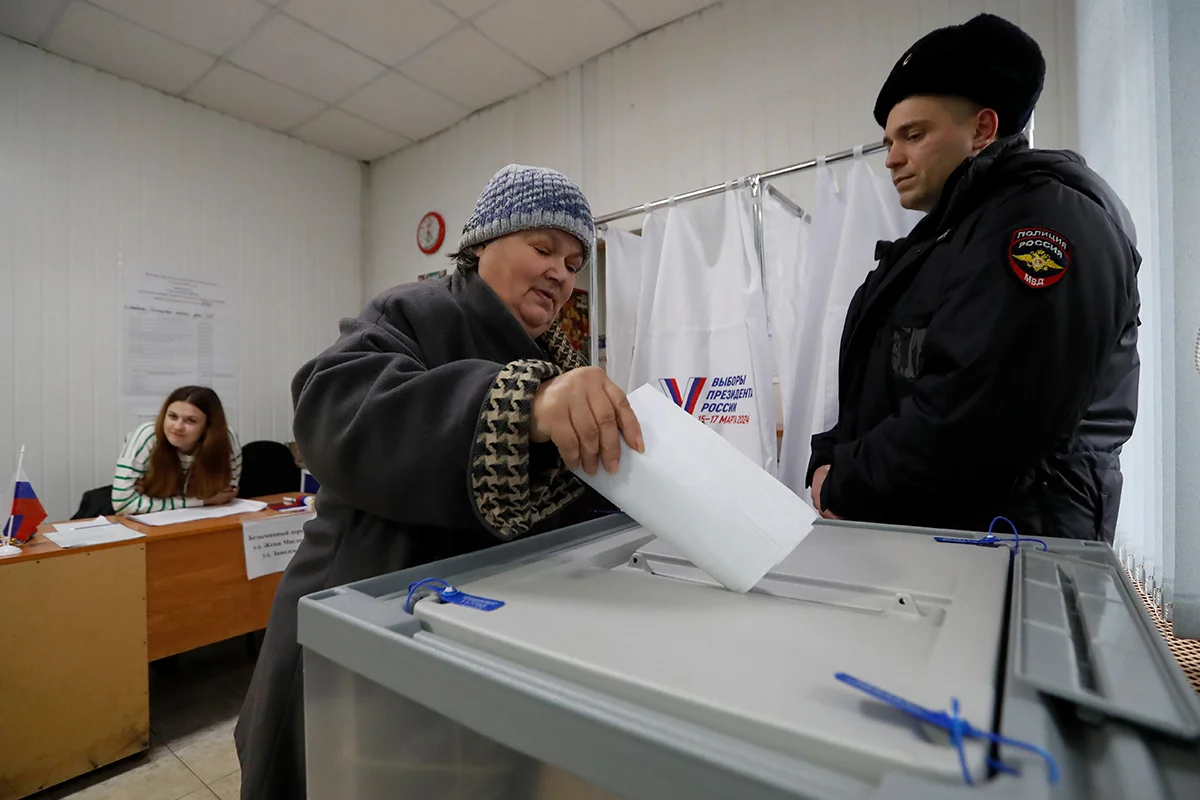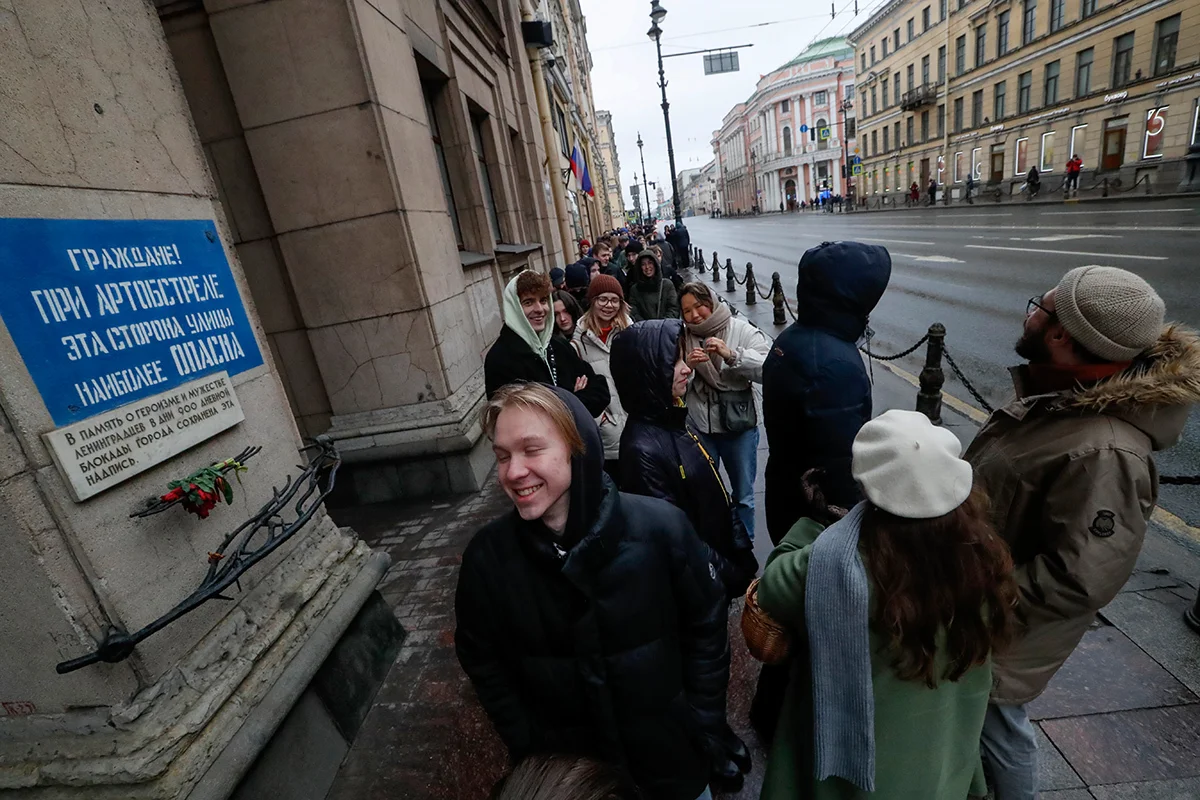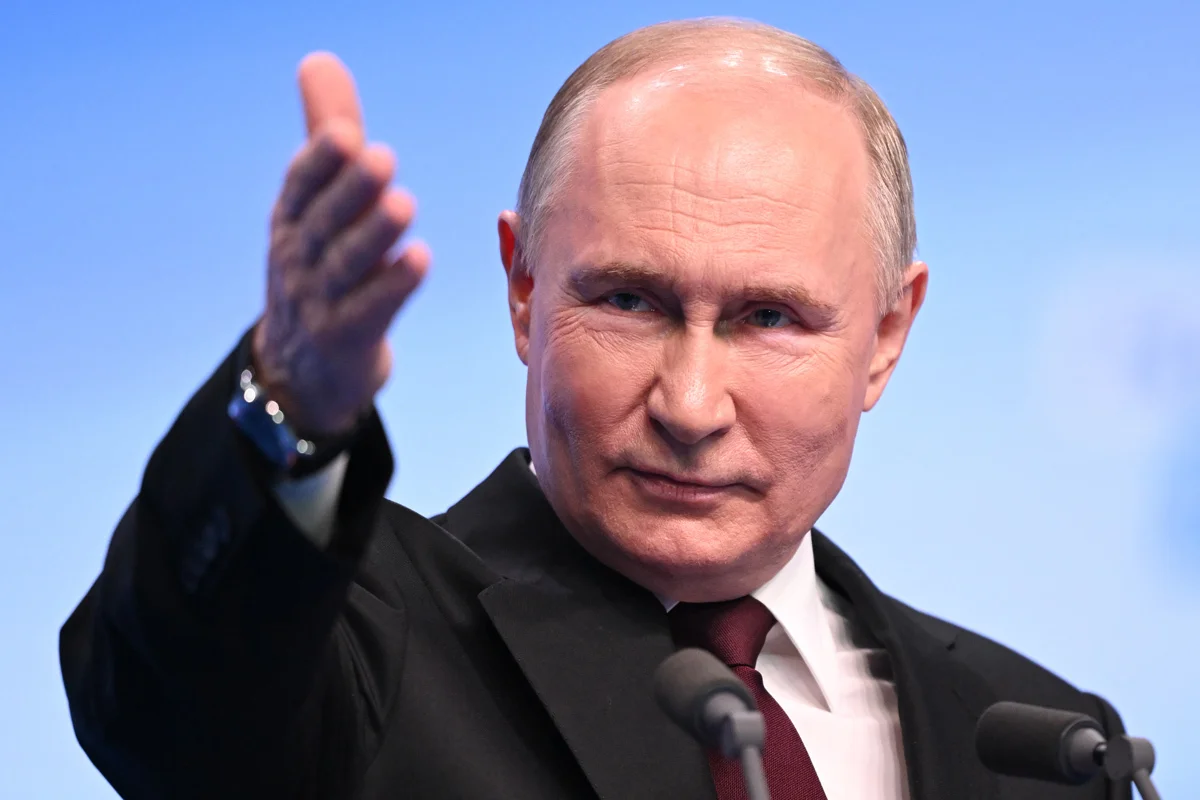After Putin's election: Further isolation of Russia?
Putin’s fifth term
In the Russian presidential elections, which were the least competitive in its modern history, Vladimir Putin was expectedly credited with 87% of the votes and an absolute “victory.” The campaign also took place in occupied Ukrainian territories amid an ongoing war, and residents of 29 Russian regions could vote online through a system that cannot be monitored. Independent electoral experts noted an unprecedented level of police arbitrariness and expressed concerns that there would be even more repressions.
“New Europe” summarizes the main initial outcomes of the campaign and discusses with political scientists what to expect after such “elections.”
Results resembling those of an Eastern dictatorship
On March 18, Russian authorities reported a record number of votes for Putin: after processing 100% of the ballots, he is said to have received 87.28% of the votes, according to the Central Election Commission. The highest result for the incumbent president was in Chechnya, where, according to official data, he received an implausibly high result — 98.99%. This is even higher than the 91.44% support attributed to him in the previous 2018 elections in Chechnya.
After processing 100% of the ballots nationwide, Nikolai Kharitonov (CPRF) received 4.31%, Vladislav Davankov (“New People”) — 3.85%, Leonid Slutsky (LDPR) — 3.20%. However, in the Moscow elections, Davankov came in second with 6.65%, while Putin received 85.13%, reported by the Central Election Commission.
Putin also received an implausible number of votes in several other regions: according to official data, he received 82.15% in the Tomsk region, 83.89% in the Irkutsk region, 84.12% in the Krasnoyarsk Territory, 86.49% in the Republic of Altai, 84.89% in Kolyma, and 95.73% in the Kemerovo region. In the occupied Kherson region, according to the Central Election Commission, Putin received 88.12% of the votes, in Zaporizhzhia — 92.83%, in the “LNR” — 94.12%, and in the “DNR” — 95.23%.
As calculated by “New Europe” using mathematician Sergey Shpilkin’s method,
about half of the votes for Putin (which is no less than 31.6 million) were fabricated.
This is a record level of vote rigging in Russian presidential elections.
In one polling station in Barnaul (No. 95), according to the commission’s first report, Kharitonov initially defeated Putin, receiving ten times more votes (763 versus 73). However, after major media outlets reported this, the commission claimed there was a mistake and that members had confused the lines in the protocol.
Additionally, the Central Election Commission reported a record turnout of 77.44%. Over 87 million Russians came to the polls, stated the head of the department Ella Pamfilova, noting that such high turnout has never been seen in the history of new Russia. In the previous presidential election in 2018, the turnout was 67.54%.
At the same time, independent observers and journalists revealed turnout falsifications in the regions. Specifically, on the first day of voting, all 136 polling stations in Stary Oskol reported the same turnout figure (47%). Also, independent election observation expert Roman Udot said on the channel “Dozhd” that on March 15, several regions were reporting identical turnout figures at different times of the day. According to Udot, this indicates falsification.
Presidential candidates in Russia are calling Putin’s result “historic.” Vladislav Davankov immediately after the polling stations closed in Russia said that he “positively” evaluates the presidential elections, calling Putin’s victory “undoubtable.” According to Nikolai Kharitonov, Russians have shown how to “unite as a whole country,” while Leonid Slutsky believes that the elections “demonstrated the stable authority of Vladimir Putin” and “an important result that will shape the development of our country for a decade.”
Immediately after the polls closed — statement on Navalny’s murder and the seizure of Ukrainian territories
Around midnight Moscow time, just a couple of hours after the last polling station in Russia closed, Vladimir Putin arrived at the electoral headquarters and held a press conference. Before the final results were announced, he stated that he “hadn’t expected” such “good” outcomes in Zaporizhzhia, Kherson, Luhansk, and Donetsk regions of Ukraine and in Crimea (all territories occupied by Russia).
During his speech to volunteers and staff members, Putin mentioned Alexei Navalny by name for the first time and said that the killing of his main political opponent was a “sad event.”
“But there have been other instances where people died in places of detention. Hasn’t this happened in the USA?” he stated.
Putin also confirmed that he was offered a deal to exchange Navalny and clarified that he was allegedly ready to agree “on the condition that he would not return”: “But unfortunately, what happened, happened. <…> That’s life.”
Furthermore, at the press conference, Putin stated that the objectives of his new term include addressing the “issues of the special operation” and strengthening the country’s defense capabilities. He warned that despite a moratorium on the death penalty, the authorities intend to treat “traitors” as an enemy side “in the zone of combat operations.”
In response to a Reuters journalist’s question about whether a full-scale conflict between Russia and NATO is possible, Putin said that “anything is possible in the modern world.” In his view, this disagreement could mean that only one step remains before World War III. “Nobody is likely interested in this,” Putin added.

Elections in a war and dictatorship environment
Political scientist Fyodor Krasheninnikov, in a conversation with “New Europe,” described the electoral procedure in Russia as “elections in a fully formed and established military dictatorship.” He believes that those who recall past experiences to analyze this voting — the least competitive in the entire history of modern Russia — are mistaken:
“In such circumstances, a military leader and dictator cannot have the same percentage as in peacetime,” Krasheninnikov said.
In a large country like Russia, 20-30% of votes against is already significant, but the authorities need to show that Putin is the “president of the majority”:
“That’s why they shamelessly fabricated some 85–90% for him,” says Krasheninnikov.
Political scientist Dmitry Oreshkin, in his comment to “New Europe,” described one of the distinctive features of the elections as “the growing and demonstrative gap between the land of facts and the heavens of idiocracy”: “Hence the deepening chasm between the rationally thinking part of the population and the majority living in the world of Putin’s narratives.
On one side, people see crowds of protesters. On the other — incredible figures from the Central Election Commission. These two realities are finding it harder and harder to coexist,” he said in a conversation with “New Europe.”
Through the electoral process, Putin, according to the political scientist, solved a key task for himself: he solidified the “image of an unbreakable vertical with himself at the top.” However, as Oreshkin emphasizes, this image is only valid for the majority for whom the symbolic (or ritualistic) component is more important than the actual state of affairs.
“It is precisely to demonstrate symbolic power, desperately needed by the archaic part of the mass thinking that yearns for Stalin, for demoralization, symbolic trampling, and destruction of the rationally thinking minority, traditionally considered the ‘opposition,’ that he needs 87%,” says Oreshkin.
Political analyst Alexander Morozov noted in a conversation with “New Europe” that “Putin completed the construction of his Putinism in these elections.” He emphasized that the elections took place on a non-alternative basis in conditions where public space was almost completely destroyed in Russia over the last two years. Putin needs these 87% to show maximum support, he continues.

“Noon against Putin”: The opposition couldn’t have done anything else in war conditions
On March 17, the “Noon against Putin” campaign took place worldwide, initiated by former St. Petersburg Legislative Assembly deputy Maxim Reznik and previously supported by Alexei Navalny. Protest lines formed in front of polling stations across the country and the world and sometimes continued until the stations closed.
In Novosibirsk, queues formed at stations in Akademgorodok, including near the Novosibirsk State University. Additionally, lines were also seen at polling stations in Chelyabinsk, Perm, Yekaterinburg, Tomsk, Moscow, Saint Petersburg, and other cities.
Russians formed lines in Riga, Vilnius, Yerevan, Belgrade, Podgorica, Paris, Brussels, Barcelona, London, Lisbon, Bishkek, Astana, Tel Aviv, The Hague, and other cities worldwide. Some traveled to other countries and cities to vote, particularly hundreds of Russians from Tbilisi and Batumi traveled to Yerevan to vote in the Russian presidential elections at two polling stations opened in Armenia.
One of the largest “Noon Against Putin” events took place in Berlin, where people lined up around the perimeter of the embassy from 9-10 in the morning and then spread to other streets. According to “New Europe”, the total length of the line in the German capital was 1.3 km.
In many countries, embassies closed while hundreds of people were still in line. As a result, in some cities, voting hours were extended, but not everyone managed to vote. In at least seven cities — Berlin (Germany), Riga (Latvia), The Hague (Netherlands), Tel Aviv and Haifa (Israel), Salzburg (Austria), and Podgorica (Montenegro) — people complained that they stood in line for more than four hours but could not enter the consulate.
Meanwhile, Russian Foreign Ministry spokesperson Maria Zakharova claimed that the massive queues on March 17 around Russian embassies and consulates worldwide were not related to the “Noon Against Putin” protest action, as people remained even after noon.
Putin, at a nighttime press conference, expressed the opinion that the action “had no effect”: “If there were calls to come and vote — I commend that. I urged to participate in the elections. If the opposition thought so, good for them. As far as I know, it had no effect. But some spoiled the ballots — that’s bad, they decided to mess with those people who came to fulfill their civic duty.”
Political scientist Fyodor Krasheninnikov, in a conversation with “New Europe,” called the “Noon Against Putin” action the only correct tactic of the opposition during this electoral process. In conditions of dictatorship, there are no elections where votes matter, and elections in this case “are drawn based on the leader’s desire, so they were,” emphasizes Krasheninnikov.
In his opinion, the queues at the embassies should affect people’s self-awareness: “Those who first went to the protest action feel good and even inspired. And those who thought that by participating in the elections they would change the situation, overthrow Putin, or show him something, and those who tried to devise a strategy on how to vote correctly to weaken or defeat the Putin regime — these people deceived themselves. And, of course, they will feel great disappointment,” added Krasheninnikov.
At the same time, political analyst Alexander Morozov stated in a conversation with “New Europe” that
the opposition had no opportunity to form a genuinely working strategy for these elections,
so the leaders of Russian opposition structures (specifically, the Anti-Corruption Foundation) tried not to articulate any single preferred action. Overstating the importance of “Noon against Putin,” according to Morozov, should also not be done, because the action worked both ways — in favor of the opposition and the authorities, he says: “Russian state agencies and propaganda presented this standing in queues as proof of high turnout and that citizens abroad also willingly go to elections, despite hours of waiting.” But in conditions of war and dictatorship, the opposition couldn’t have done anything else, Morozov emphasizes.

Voters were never so intimidated: Three days of coercion and detentions
The elections took place without independent observation, amid fear and coercion, according to the “Golos” report. The movement also notes an unprecedented surge in violence and an increasing shift of power to the police.
At least 80 people were detained during the elections in 20 cities, as counted by the human rights project “OVD-Info.”
Specifically, two protocols under the article for “discrediting” the army were issued against a CPRF observer Damir Khisyametdinov in Balakovo (Saratov region) due to a complaint by a journalist from “ProBalakovo,” who didn’t like a phrase Khisyametdinov allegedly said: “Putin throws people under tanks for 250,000 rubles a month.” He was fined 45,000 rubles for this. The second “discreditation” was found in a photo from February 2022 on Khisyametdinov’s VKontakte page.
Karina Gradusova from Kolomna near Moscow was detained with her eighteen-month-old child over children’s scribbles on a ballot. The woman was fined, but the amount and the specific article were not disclosed.
In Cherepovets, local resident Vladimir Burov was detained for trying to take a ballot from the station. According to him, the police used force on him. He was charged with petty hooliganism (Art. 20.1 of the Code of Administrative Offenses).
In Moscow, UEC member with a decisive vote Vyacheslav Golikov was detained for wearing a “Navalny” T-shirt. Initially, the man was simply asked to change his clothes, but after he complied, police took him to the “Basmanny” police station. He was charged with displaying prohibited symbols and then released.
A CPRF observer in the Saratov region was detained for a conversation about the war in Ukraine. According to “OVD-Info,” on March 16, a local journalist provoked an observer into a conversation about the war. Afterward, she described his words as “discrediting” the Russian military. He was fined 45,000 rubles.
In Bratsk, Alexander Shokhirev was detained after voting and taken to the police station where he was beaten for “voting the wrong way.” According to his wife, after he left the polling station for work, the police arrived there: at the police station, they forced Shokhirev to the ground, beat him, threatened to cut off his finger, and also took away his documents and phone.
Police detained voters for inscriptions on ballots. Specifically, a voter was detained in Ramenki, Moscow, for the inscription “Putin is a murderer”; similar incidents occurred in Odintsovo and Podolsk in the Moscow region.

Criminal cases, ballot box sabotage, and arsons
During the elections, observers recorded an unprecedented surge in violence. Reports of massive ballot spoilage with green ink, arson of ballot boxes, and even fake bomb threats were received all three days. Mostly, there were no casualties, but there were injuries in Perm. On March 17, a 64-year-old local woman set off a powerful firecracker at a polling station, injuring her hand, and 50 people were evacuated.
Some voters also tried to throw firecrackers and Molotov cocktails at stations. Those attempting arson claimed they were forced into it by fraudsters. According to “Voices” experts, the criminalization of the elections is linked to the general tension within the country.
The Ministry of Internal Affairs initiated at least 61 criminal cases and 155 administrative cases over the three days of elections. Among these, 21 were for “hindering the exercise of voters’ rights,” 23 for false bomb threats at polling stations, and another 33 for bringing paint substances to the stations.
At least two people have been arrested in Moscow and Saint Petersburg. “Many” cases of electoral spoilage were “broadcast live to Ukrainian territory,” the Ministry claims.
Due to arson and the use of paint substances during the elections, 214 ballots were spoiled, stated by Ella Pamfilova, head of the Central Election Commission. According to her, there were nearly 29 attempts to burn or pour liquids on ballot boxes in 20 Russian regions over almost two days.
“Rampant propaganda”
Vladimir Putin has already outlined the program for the next six years, highlighted political analyst Alexander Morozov in a conversation with “New Europe”: a massive restructuring of the economy to meet the needs of war and based on prolonged isolation, and the increase of ideology , which should label people as “us or them.”
“Towards ‘them,’ repressive measures of various kinds will be applied: they will be forced out of the country, arrested, deprived of the opportunity to work and earn,” he emphasized.
Morozov believes Putin has established a political regime where leaders “receive” 90 to 100% of votes in elections.
Putin has also set himself the task of “completely destroying the Ukrainian state,” the analyst emphasizes: “It’s not about the territorial capture of specific regions of Ukraine, but the destruction of Ukraine as a state and forcing the Ukrainian population to total loyalty to the Kremlin.”
Political scientist Dmitry Oreshkin thinks the main horror of the current campaign is that Russia has completed its transformation into something akin to modern Iran or the former USSR. In this system, the key role is played not by objective reality – economy, demography, international geopolitical isolation, increasing military losses and expenses, toxicity of the Russian language and culture – but by “rampant propaganda.”
A result of 87% frees Putin’s hands for the endless continuation of the war, for the expansion of repressions against “enemies” of his power and “further descent into madness under the prolonged, enthusiastic applause of the working people and his closest circle,” stated the “New Europe” interlocutor.


















